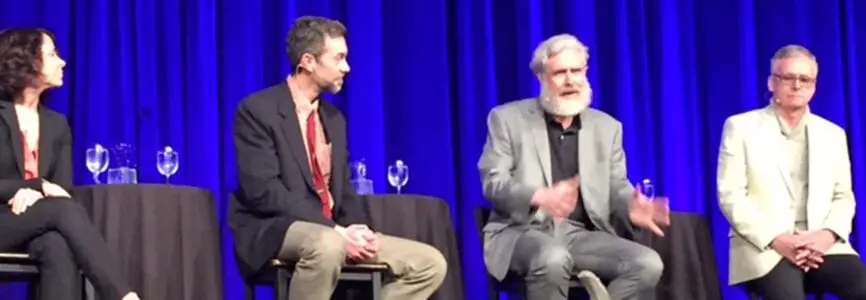Hastings Center News
Hastings Center Scholar Participates in Isaac Asimov Memorial Debate on De-Extinction
Seated on a stage with a museum model of a dodo and a pair of mammoth tusks, a panel of experts debated what is exciting and what is frightening about scientific efforts to bring back extinct species — particularly those lost because of human activity.
The occasion was the 2017 Isaac Asimov Memorial Debate at the American Museum of Natural History in New York, on March 29. The panelists included Gregory Kaebnick, a Hastings Center research scholar and editor of the Hastings Center Report. Neil deGrasse Tyson, the Frederick P. Rose Director of the Hayden Planetarium, hosted and moderated the debate, which he approached as if it were “a discussion in a bar.”
Other panelists were George Church, a professor of genetics at Harvard; Hank Greely, a professor of law at Stanford and a Hastings Center Fellow; Ross MacPhee, a curator in the Department of Mammalogy at the museum; and Beth Shapiro, author of How to Clone a Mammoth, a MacArthur Fellow, and a professor in the University of California, Santa Cruz Genomics Institute.
The discussion was wide-ranging. Do we have a moral obligation to bring back extinct species, particularly those that have gone extinct because of human activity such as overhunting or climate change? The scientists were doubtful that long-extinct species could ever be brought back to life as they were. Instead, the scientists raised the prospect of using DNA recovered from extinct species, such as a wooly mammoth, and combining it with DNA from existing relatives, such as the Asian elephant, to produce a hybrid – a “mammophant.”
But what would mammophants eat, and where would they live? Is it moral to “de-extinct” an animal and put it in a zoo, or a “Pleistocine Park?” What criteria should we use to decide which species to restore? Is it moral to render species we don’t like extinct? How can we have the wisdom to harness de-extinction for the good, and not weaponize it?
Toward the end of the event, deGrasse Tyson asked Greg Kaebnick, “Where’s the moral compass here?” Kaebnick argued against making categorical pronouncements about whether we should or should not proceed with de-extinction. Instead, he proposed evaluate each application on a case-by-case basis. “We need to have society-wide discussions,” he said, and he commended scientists such as George Church who are calling for that. Watch the debate here.

